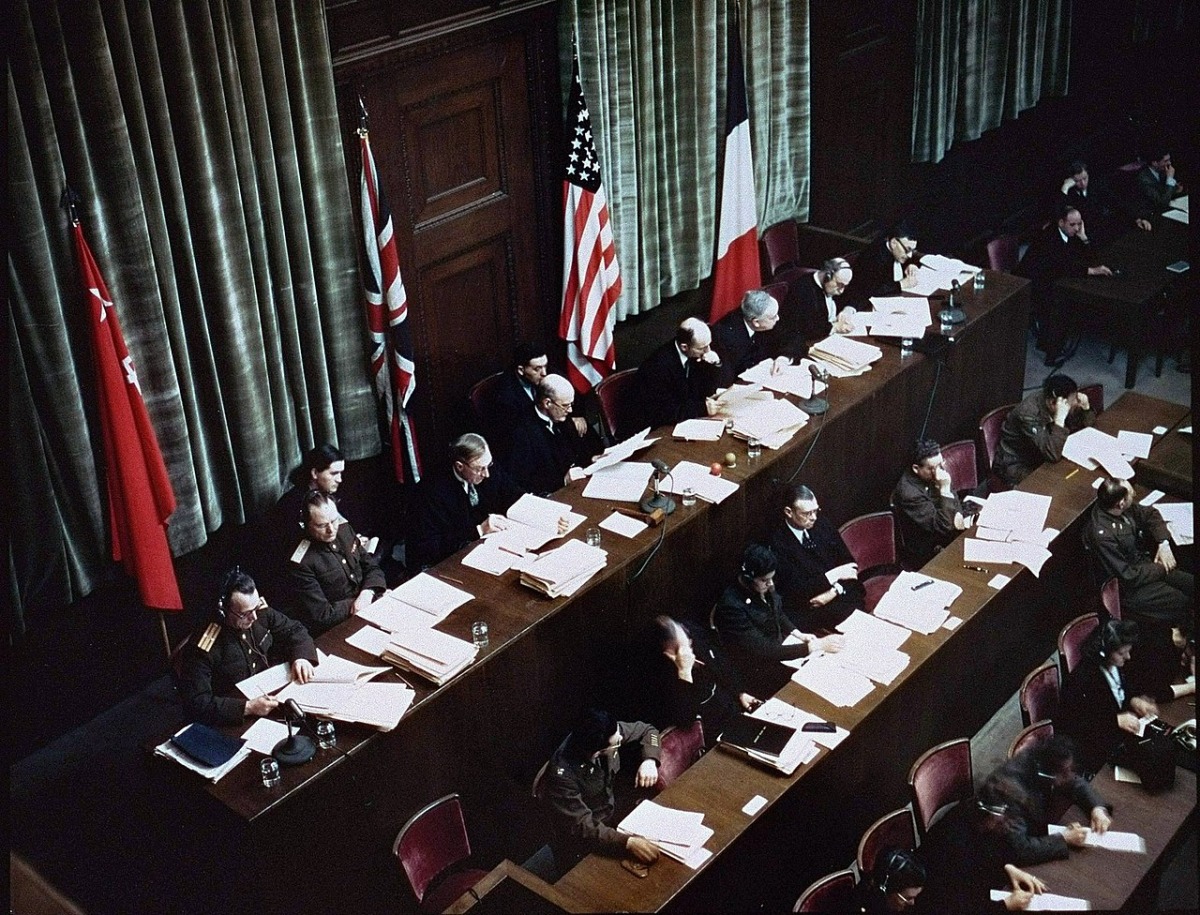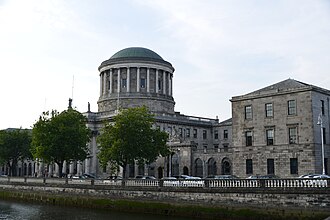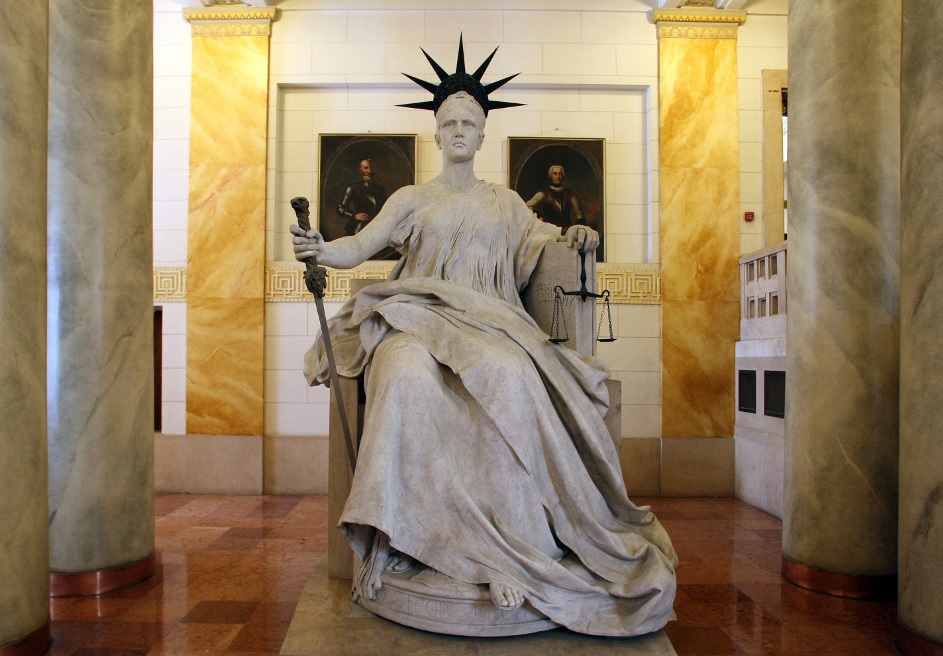In the first part of this series, London-based barrister, who taught Jurisprudence for sixteen years in the Honorable Society of the King’s Inns in Dublin, David Langwallner takes issue with Irish Supreme Court Justice Gerard Hogan devotion to Legal Positivism, instead arguing morality and politics should inform the law. He elaborates further on that debate in this article.
This piece details what I believe is absent in the form of Legal Positivism that has been advocated by Supreme Court Judge Gerard Hogan. Indeed, there is a wider blind spot among the Irish legal establishment on whether jurisprudence should go beyond Legal Positivism, into the territory of Natural Law.
A few years ago this debate might have been confined to the classroom and seminar, but it now assumes central importance.
There is currently a crisis of legitimacy in the Rule of Law worldwide, unprecedented since the 1930s, and Ireland is not exempt. In my view Positivistic limitations on the subject is a sign of intellectual infantilism – an unnecessary curtailment of the boundaries of law, and what it means. Worse still, Legal Positivism contributes to a false assurance of just outcomes.

The Nuremberg Trials.
The Fundamental Question of Jurisprudence
Let us thus address the fundamental question of jurisprudence: what law is, and what that matters in its practice?
For a Positivist, the essence of law is legal fact, if it stems from an authoritative source often referred to as the Sovereign. Or let us call it, as Hans Kelsen and Hogan do the grundnorm (‘basic norm’). Then the law is divided into rules conferring powers on officials, within a given system, to apply them. This process occurs at a remove from politics or morality.
H. L. A. Hart, the other leading Positivist with Kelsen, calls these rules either primary or duty imposing rules, or secondary or power conferring rules, which often rely on enforcement by adjudication by tribunals or courts, but not, it seems, by interpretation. That is the initial fallacy.
Thus, according to Legal Positivism the job of any official is to apply rules literally. Giving, what Ronald Dworkin called, ‘plain facts their plain meaning.’
Yet, very little is ever plain, and as the leading jurist of the 20th century, not Kelsen but Dworkin, maintained law is a question of the interpretation, not the application, of plain facts. It is also about principle not authority. And the texture of law is slippery and often as unclear as mud. Hence legitimate legal interpretation is a matter of law, not purely political philosophy. That is the crucial point and the one Hardiman and Hogan, among other UCD Positivists, fail to understand.
Consider this in a different context. Imagine a witness says someone’s hair is dark, the question becomes how dark on a scale of 1-100, and was there any grey in the darkness? There is invariably a lack of clarity on any matter, and even the arch-Positivist Hart conceded an open texture or fuzziness even to statutory rules.
That concession by Hart – as Dworkin correctly maintains – undermines his whole theory. For Hart, where the rule is fuzzy, he suggests a judge use his discretion. Dworkin correctly queries whether discretion per se should form any part of a legal dispensation.
In fact, given that many rules have an open texture – in that they are capable of various interpretations – the reliance on an untrammelled or open-ended discretion, as Dworkin maintains, undermines Hart’s conception of Legal Positivism. The natural lawyer John Finnis also correctly points out, in parenthesis, a weakness to Hart’s internal point of view, crucial to his Positivist agenda. To save Legal Positivism from morality Finnis points out, by using normative language such as ‘ought’ or ‘should’ Hart is conceding a moral component to law.
Contrary to Hogan’s position on legal interpretation, Dworkin contended that it must involve political and moral interpretation, and not be an exercise in literalism or strict constructionism.
To make sense of law as a corpus and not rely on discretion per se law legal interpretation must be an exercise in principled interpretation. Only then can it create a seamless whole that is not a web of deceit, or draconian rules, but one of justice.

Adolf Eichmann
Slow Train
The abandonment of principle and constitutional rights is a slow train to the sort of cognitive dissonance embodied in the likes of Adolf Eichman, when he argued he was only doing his job. This is the divorce of officialdom from morality.
Such issues led to the famous Hart-Fuller Debate on the relationship between law and morality and to a consideration of retroactive laws. Fuller in effect maintained we owe no obedience to laws without a tinsel of legality. Even Kelsen applied retroactivity exceptionally in the case of the Nazis.
Dworkins progenitor and mentor is John Rawls, who is decidedly back in fashion in the academic community. Not that his ideas have ever gone away entirely, but his critique of neoliberalism and his conception of a just society seems more pertinent than ever,
Daniel Chandler in his recent book Free and Equal: What Would a Fair Society Look Like? (2023) argues that there is a broad approval among academics around the ideas of the maximisation of liberties; a measure of discrimination in favour of the disadvantaged; and an element of putting money aside for future generations to meet the economic and environmental devastation of neoliberalism. To our power brokers, however, these principles have little or no significance. Seemingly, as Chandler contends, the more Rawls gains traction in the academic community, the less his ideas are implemented by our rulers.
Of course, Rawls is a political philosopher and though he does address law, he does not do so with the precision of Dworkin.
For Dworkin the answer is very clear: our judiciary have a moral and principled obligation to interpret laws in a socially just way to protect the innocent, the disempowered, the accused and sanction the government when required. This also includes the moral obligation not to defer to a Separation of Powers, but to declare a law unconstitutional when it is called for. It also includes a non-textualist approach to read rights into the constitution as a living instrument, to protect the rights of the citizen, and non-citizen.
In Ireland the lure of Legal Positivism and the abandonment of the wisdom of Rawls and Dworkin among the judiciary has led to the non-enforcement of social and economic rights. This has contributed to a housing and homelessness crisis, tearing apart the very fabric of our society and fuelling the rise of the far right.
The judiciary could have easily followed Canadian and South Africa as well as Indian Jurisprudence, which either give vitality to the Right to Life contained in Article 2 of the Constitution, by including the quality of that life. They might have also revived Article 45, and thus the social contract.
Ensnared by banking interests, debt, and agency capture, the courts have failed to intervene. These decisions and non-decisions are unforgiveable, immoral, and even borderline criminal.
Further, In Rawlsian terms They have not maximised rights over absurd limitations on public and common good considerations, thus systematically destroying due process and privacy rights, ignoring or sidelining EU and ECHR law along the way. They have given ever more power to our police forces, standing idly by as 24-Hour Surveillance takes place, with more special courts to come, amidst an unspecified emergency.

The Four Courts, Dublin.
Long Dead Values
Our gatekeepers have deferred to long dead values. They have not utilised the constitution progressively, and failed to protect non-nationals adequately. I suspect they will curtail freedom of speech if the hate speech bill passes.
Since Adrian Hardiman, and indeed before, they have been utterly useless in upholding the constitution.
Part of the Positivist agenda is to focus on Positivistic realism. Realism, though useful in some respects as an analysis of trial practice and what courts do, justifies cynicism and above all Populism. If there is one idea that captures the leading realists Karl Llewellyn’s conception of policy, it is the will of the majority, or what people want. What Hogan terms the grundnorm of popular sovereignty.
The problem with deferring to Populism in our present Dark Age is that we are dealing with agency capture of the media, excessive blind sheep obedience, alt-right mob rule and the enforcement of it through legislation, such as anti-immigrant measures or mass surveillance.
It is in fact important for judges to be, as Dworkin put it, philosopher monarchs, in the sense of vindicating rights against tyranny. Thus, gatekeepers must protect rights against tyranny and realise that, as Hannah Arendt put it, we should have the right to have rights.
In Ireland the judiciary defer to Kesean popular sovereignty and judicial restraint. It is correct to see them as accomplices to evil. Even Hogan, our finest judge, risks selling his soul to the devil.

Justitia in the Superior Courts Building in Budapest, Hungary.
Are Rules Important?
The other fundamental question is whether rules are really that important. The realist scholar Roscoe Pound called them merely pretty playthings. This is the view, commonly held among realists, that a judge reaches the subjective conclusion, dictated by policy considerations and then makes the rules fit the facts. In short, the rule is an intellectual justification of a conclusion. This is a view I have some sympathy with, but it again demonstrates the obsolescence of black letter law.
Crucially, Dworkin gives rules or plain fact more weight, and thus does not undermine legality but argues that a rule or even the plain fact of a rule is subordinate to the interpretation of principle. Thus, the judge is obliged to attempt to achieve the best creative and constructive sense of the law as a matter of principle, where principles have dimensions of weight and importance, and rules do not.
The important point comes where there is a conflict between a rule and a principle. Here the principle, whether legal or moral, prevails.
Dworkin points to the Lord Atkins Neighbour principle in the foundational case in Tort Law Donoghue v Stevenson (1932), to the effect that constitutional values are principles in the law. Indeed, a crucial application of principle is where a law is declared unconstitutional. That is when a Positive law struck down by a principle. Or when the principles of the ECHR are enforced, which we rarely see, rendering our constitution a nudum pactum – a promise that is not legally enforceable.
In this respect by its embrasure of literalism and historicism in judicial interpretation, Legal Positivism negates the spirit of the law, and deems crucial issues non justiciable. It does not protect matters of principle and rights, and fails to develop the constitution as a living instrument to adapt to changing circumstances.
The negation of this development of constitutional rights has led in America to the justification of handguns, in that they were commonly in use at the time of the American Revolution by the historicist Scalia, and the over-ruling of Roe Versus Wade, as inter alia in a specific context it sought to graft a non-literal privacy right into the constitution of the US.
Dworkin’s principled interpretation, unlike Legal Positivism, takes rights seriously and takes issue with legal realist premises, based on majoritarianism, that rights are subservient to policy consideration.




